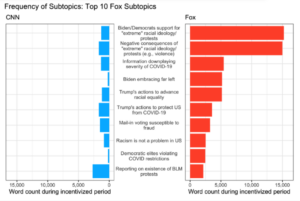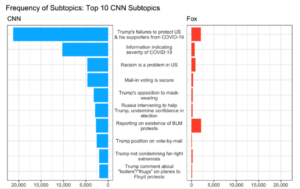Partisan media outlets like Fox News pose a hazard to democracy by denying their viewers’ access to information detrimental to conservative candidates and causes while amplifying misinformation about their opponents, according to a study into the role of selective content on viewers’ political beliefs and voting behavior.
Presented in a working paper by University of California at Berkeley political scientist David Broockman and Yale University political scientist Joshua Kalla, the study also found sectarian media do not merely reinforce viewers’ existing beliefs but shape attitudes and choices by steering them toward skewed data.

David Broockman

Joshua Kalla
“In other words, partisan media does not simply remind people of certain beliefs they already hold (priming), it leads viewers to learn about a biased set of facts, which appears to have consequences for their attitudes. Interestingly, our participants agreed with this diagnosis — participants in the treatment group were more likely to agree that if Donald Trump did something bad, Fox News would not cover it.”
The study found, however, that merely changing the media sources consumed by partisans had the power to change their attitudes.
A treatment group, or sample, selected by Broockman and Kalla consisted of 763 individuals with an average age of 54. Most were white (95%) and Republican (92%) and on average reported regularly watching Fox News 14 hours per week. The co-authors partnered with media company Bully Pulpit Interactive to conduct the study.
“To change the slant of their media diet, we offered a randomized treatment group of participants $15 per hour to watch up to seven hours of CNN per week during September 2020, prioritizing the hours at which participants indicated they typically watched Fox News. We enforced compliance with viewership quizzes,” the co-authors explained in the paper.
The project also marked the differences in coverage between CNN and Fox News during the period of the study to demonstrate the limited ways in which the conservative news outlet emphasized or de-emphasized information to promote then-President Donald Trump or undermine then-presidential candidate Joe Biden.
 “For example, on COVID-19 CNN extensively reported ‘Trump’s failures to protect U.S. and his supporters from COVID-19,’ while Fox News spent only 2,086 words doing so. Likewise, CNN spent 10,251 words discussing the severity of COVID-19, while Fox News devoted only 709 words to this. Instead, Fox News reported information downplaying the severity of COVID-19 and the efforts Trump had undertaken to protect Americans from the virus. On the other hand, Fox News’ main focus during this time was on racial issues and related racial protests in American cities during the summer of 2020; Fox News indicated that Joe Biden and Democrats generally supported the protesters’ tactics and demands.”
“For example, on COVID-19 CNN extensively reported ‘Trump’s failures to protect U.S. and his supporters from COVID-19,’ while Fox News spent only 2,086 words doing so. Likewise, CNN spent 10,251 words discussing the severity of COVID-19, while Fox News devoted only 709 words to this. Instead, Fox News reported information downplaying the severity of COVID-19 and the efforts Trump had undertaken to protect Americans from the virus. On the other hand, Fox News’ main focus during this time was on racial issues and related racial protests in American cities during the summer of 2020; Fox News indicated that Joe Biden and Democrats generally supported the protesters’ tactics and demands.”
The project found that study participants took notice of the differences in coverage to the extent that attitudes toward current events and political figures and preferences were influenced. “In a follow-up survey launched three days after the incentivized viewership period ended, we found substantial learning. First, we found large effects of watching CNN instead of Fox News on participants’ factual perceptions of current events (i.e., beliefs) and knowledge about the 2020 presidential candidates’ positions. … We also found substantial evidence for agenda setting, as treated participants were much more likely to see issues covered on CNN (COVID-19) instead of on Fox News (racial protests) as important.”
 A follow-up survey conducted two months later found that returning to a Fox News-only diet resulted in a return to pre-study attitudes. “In other words, our results show how strong voters’ preferences are for consuming like-minded media, and that this media may continually ‘replenish’ people’s partisan loyalties and political beliefs, giving it tremendous ongoing power even if its immediate effects are short-term.”
A follow-up survey conducted two months later found that returning to a Fox News-only diet resulted in a return to pre-study attitudes. “In other words, our results show how strong voters’ preferences are for consuming like-minded media, and that this media may continually ‘replenish’ people’s partisan loyalties and political beliefs, giving it tremendous ongoing power even if its immediate effects are short-term.”
Also illuminated was the role of distorted facts in shaping political opinions. “Our findings also suggest that partisan media’s role in spreading misinformation without making explicitly false claims should be a focus of future research. For example, even though Fox News never explicitly stated that Biden supported cutting police funding, it strongly implied this, and respondents who were assigned to continue watching Fox were more likely to believe this.”
The larger implications of these findings may be ominous to the nation, the authors concluded, explaining that “our results indicate challenges that partisan media may pose for democratic accountability. Our findings suggest that partisan media may affect voters’ choices at least in part because it is less likely to cover information about aligned incumbents’ failures and distorts perceptions of political rivals. This suggests that partisan media does not only present a challenge for the opposing party, it may present a challenge for democracy.”
Related articles:
From religion to immigration to COVID, Fox News creates divisions even among Republicans
Baptist Press, Fox News and America’s departure from reality
Tucker Carlson undermined COVID vaccines 99% of the time his show discussed them


